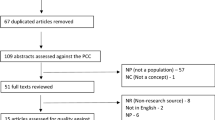Abstract
Objective
The purpose of this study is to prepare fourth-year medical students to recognize psychiatric emergencies using simulation technology. The learning experience is accomplished during the boot camp activity designed to train fourth-year medical students in different competencies before transitioning to residency.
Methods
Ninety-eight fourth-year medical students at Paul L. Foster School of Medicine participated in the boot camp during the 2018–2019 academic year. The participation of the Department of Psychiatry was for a total of four full days divided into 3-h morning and 3-h afternoon sessions with the average of four students per hour per session. The use of high-fidelity simulation and standardized patients to recreate two different clinical scenarios representing acute psychiatric emergencies, followed by structured debriefing, was implemented. Pre- and post-qualitative surveys, which were electronically available via Qualtrics, intended to assess the effectiveness of the curriculum and course teaching modalities during the boot camp.
Results
All participants reported improvement on levels of confidence in diagnosis and management of psychiatric emergencies compared with baseline. Overall a statistically significant increase in the Likert score was noted in the post-survey analysis.
Conclusions
Teaching psychiatric emergencies utilizing high-fidelity simulation and standardized patient encounters improved student confidence in several competencies. The increase in student confidence can potentially help the learner in transitioning better to residency.

Similar content being viewed by others
References
Bradley P. The history of simulation in medical education and possible future directions. Med Educ. 2006;40:254–62. https://doi.org/10.1111/j.1365-2929.2006.02394.x.
Good ML. De Patient simulation for training basic and advanced clinical skills. Med Educ. 2003;37 Suppl 1:14–21.
Thomson A, Cross S, Key S, Jaye P, Iversen A. How we developed an emergency psychiatry training course for new residents using principles of high-fidelity simulation. Med Teach. 2013;35:797–800.
Williams JC, Balasuriya L, Alexander-Bloch A, et al. Comparing the Effectiveness of a guide booklet to simulation-based training for management of acute agitation. Psychiatr Q. 2019;90:861–9. https://doi.org/10.1007/s11126-019-09670-z.
Core entrustable professional activities for entering residency. Faculty and learners’ guide. AAMC. https://www.aamc.org/system/files/c/2/484778-epa13toolkit.pdf.
Core entrustable professional activities for entering residency. Curriculum developers guide. AAMC https://www.aamc.org/system/files/c/2/484778-epa13toolkit.pdf.
Attoe C, Kowalski C, Fernando A, Cross S. Integrating mental health simulation into routine health-care education. Lancet Psychiatry. 2016;3(8):702–3.
Cook David A, Brydges R, Hamstra SJ, Zendejas B, Szostek JH, Wang AT, et al. Simulation in healthcare. J Soc Simul Healthcare. 2012;7(5):308–20. https://doi.org/10.1097/SIH.0b013e3182614f95.
Zendejas B, Brydges R, Wang AT, Cook DA. Patient outcomes in simulation-based medical education: a systematic review. J Gen Intern Med. 2013;28:1078–89. https://doi.org/10.1007/s11606-012-2264-5.
Abdool PS, Nirula L, Bonato S, Rajji TK, Silver IL. Simulation in undergraduate psychiatry: exploring the depth of learner engagement. Acad Psychiatry. 2017;41:251–61. https://doi.org/10.1007/s40596-016-0633-9.
Author information
Authors and Affiliations
Corresponding author
Ethics declarations
Conflict of Interest
The authors declare that they have no conflict of interest.
Ethical Approval
The study was exempt by IRB.
Informed Consent
NA
Additional information
Publisher’s Note
Springer Nature remains neutral with regard to jurisdictional claims in published maps and institutional affiliations.
Rights and permissions
About this article
Cite this article
Dominguez-Colman, L., Mehta, S.U., Mansourkhani, S. et al. Teaching Psychiatric Emergencies Using Simulation: an Experience During the Boot Camp. Med.Sci.Educ. 30, 1481–1486 (2020). https://doi.org/10.1007/s40670-020-01095-9
Accepted:
Published:
Issue Date:
DOI: https://doi.org/10.1007/s40670-020-01095-9




